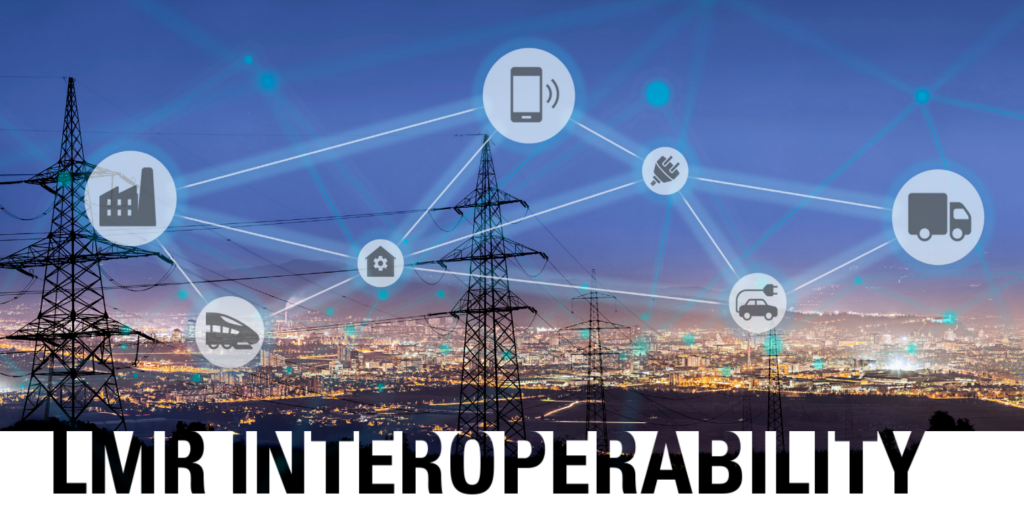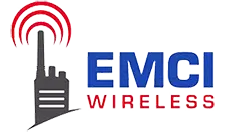If you are a business owner or office manager, you know one thing is certain: Communication is a must. But as people get busy throughout the day, with part of the team in one part of your facility and others elsewhere, fast communication, especially when an emergency or urgent need arises, can be challenging, to say the least.
That’s where land-mobile radios can come in to save the day. In this article, we’ll answer the question, what does LMR mean, and share what you need to know about why two-way radios are a smart, reliable communication tool for businesses of all sizes, whether you’re running a busy facility or managing teams across multiple sites.
Defining LMR: What It Stands For and How It Works
Okay, so at this point, you already know that LMR stands for land-mobile radio. But what does that really mean?
Land-mobile radio systems are two-way radio networks used for voice communication between mobile users, whether that’s someone in a vehicle, on foot, or operating from a central command center. Unlike phones that rely on Wi-Fi or cell towers, LMR systems operate on dedicated radio frequencies and are built for direct, fast, and reliable communication. They’re commonly used by:
- Law enforcement agencies
- Fire departments and EMS teams
- Utility crews and linemen
- School security and administrators
- Stadium staff and event coordinators
- Industrial and manufacturing facilities
These systems come in two main formats: analog and digital.
Analog LMR
- Simpler technology
- Typically lower upfront cost
- Basic voice-only communication
Digital LMR
- Clearer audio and less background noise
- Better signal range and battery efficiency
- Can support text messaging, GPS tracking, and encryption
A standard LMR system includes a few key components:
- Base station: The central hub for managing transmissions
- Repeaters: Devices that boost signal strength to extend coverage
- Handsets or mobile radios: Devices used by staff in the field or vehicles
- Antennas: Installed on vehicles, buildings, or towers to improve signal reception
Together, these parts create a reliable communication network that keeps teams connected, no matter where the work takes them.
Types of LMR Systems
Now that you know the LMR meaning and how these systems function, it’s helpful to understand the two primary types of land-mobile radio systems: conventional and trunked. The structure of each system affects how users access channels, share bandwidth, and maintain consistent communication.
Conventional LMR
- Operates using dedicated channels
- Users manually select a channel before transmitting
- Ideal for smaller teams or operations with lower communication traffic
- Simple to use, but can lead to channel congestion during high activity
Trunked LMR
- Automatically assigns available channels to users
- Optimizes channel usage by allowing multiple talk groups to share frequencies
- Better suited for large organizations or high-volume communication needs
- Offers improved scalability and efficient spectrum use
In addition to how channels are assigned, LMR systems can also differ by digital communication standards. These include:
- P25 (Project 25): Widely used by public safety agencies in the U.S.
- DMR (Digital Mobile Radio): Popular in commercial and industrial settings
- TETRA: More commonly used internationally
In the U.S., P25 is the most common digital standard, especially for public safety and government use, offering secure, interoperable communication across departments.
Who Uses LMR and Why It Matters
LMR systems are used every day in industries where immediate, clear communication isn’t just helpful. It’s necessary. Public safety teams like police, fire, and EMS depend on LMR for coordination during emergencies. Utility workers use it to communicate while restoring power in remote areas. In schools, staff and security rely on it to respond to incidents quickly. Even manufacturing, warehousing, and event staff use LMR to stay connected across large properties or noisy environments.
Why does this matter? Because when timing is everything, you can’t afford delays. Imagine a fire alarm going off at a large manufacturing plant. A manager reaches for their cell phone, scrolls through contacts, and dials the floor supervisor. And it rings, and rings. And that’s assuming that there isn’t something going on that prevents the cell from going out or connecting. Compare that to a supervisor pressing one button on a two-way radio to instantly notify multiple team members at once.
LMR systems don’t rely on overloaded cellular networks or Wi-Fi. They deliver fast, push-to-talk communication, even in areas with poor cell coverage. That kind of reliability makes all the difference in preventing injuries, managing evacuations, and resolving problems quickly, whether it’s a safety concern, an equipment issue, or a logistical snag during a live event.

Benefits of Using LMR in Your Business
The scenario we pointed out above gives you a good idea of one of the key benefits of LMR usage. Instant communication when it matters most. But that isn’t the only benefit. Consider the following.
- Instant push-to-talk communication: No time lost dialing, waiting for a connection, or dealing with voicemail. Just press and speak.
- No dependence on cellular or Wi-Fi networks: LMR operates on its own radio frequencies, making it reliable even during outages or in remote locations.
- Private and secure communication: Digital LMR systems can be encrypted, which helps protect sensitive conversations from being intercepted.
- Clear audio in noisy environments: Built specifically for loud, active workplaces like construction sites, stadiums, and manufacturing floors.
- Team-wide coordination: Broadcast to groups or individuals instantly, helping everyone stay informed and aligned without delays.
- Long battery life: Designed for long shifts, many LMR handsets can last an entire workday, or longer, on a single charge.
- Rugged and reliable hardware: LMR devices are made to handle drops, rough handling, and extreme weather conditions better than standard smartphones.
LMR vs. Cell Phones and Other Communication Tools
At EMCI Wireless, we hear from business owners all the time who mention that they prefer to rely on their cellular device. But then something happens, and a call doesn’t come through, and they’re back in one of our retail locations, asking for help. We get it. Cell phones are great, and they serve a purpose. But they’re not the best communication device when fast communication is a must.
LMR offers near-instant push-to-talk capability, which means no dialing, ringing, or connection delays. Just one button and you’re connected. Unlike cell phones, LMRs don’t rely on third-party service providers or fluctuating network coverage. They work independently, providing consistent communication even during power outages or when towers are overloaded.
From a cost perspective, LMR can be a smarter long-term investment. Once your system is in place, you avoid recurring carrier fees and get devices built to last.
LMR also complements other tools. It’s common for businesses to use LMR for operations and keep phones for external calls or apps. It’s not about replacing one with the other. It’s about using the right tool for the job. And when fast, reliable communication is the job, LMR delivers.
Choosing the Right LMR System for Your Business
When it comes to LMR systems, there really isn’t a one-size-fits-all solution. That’s why we ask you to consider the following questions before making a decision:
- How large is your facility or coverage area? A warehouse will have different needs than a multi-site operation.
- How many people or teams need access? The number of users impacts how many channels or talk groups you’ll require.
- Will the radios be used indoors, outdoors, or both? Some environments require more rugged equipment or stronger signal support.
- What range and frequency do you need? UHF may be better for buildings, while VHF may perform better in open outdoor areas.
Once you’ve identified your needs, it’s time to decide between portable radios (handheld units) and mobile radios (vehicle-mounted or desk-based units). Portables offer flexibility and mobility, while mobiles are ideal for teams on the move, such as those in trucks or service vehicles.
This is where working with a provider like EMCI Wireless makes all the difference. We help you assess your unique environment, recommend the right technology, and deliver ongoing support to keep your team connected from day one.
LMR Isn’t Just for Emergency Teams. It’s for Every Business That Depends on Clear Communication
Land-mobile radio (LMR) systems provide fast and reliable communication, eliminating the need for cellular networks or Wi-Fi. From public safety to manufacturing, education to events, businesses across many industries benefit from the instant connectivity and rugged performance LMR provides.
If your team depends on quick, dependable communication, it may be time to rethink your current setup. Don’t wait until an outage or delay causes a problem. Get ahead of it with a solution built for your environment.
EMCI Wireless is a proud Motorola channel partner serving southern and central Florida, including Fort Lauderdale, Orlando, Tampa, and more. Contact us today to design and deploy a custom LMR solution that keeps your business running without fail, no matter what comes your way.

